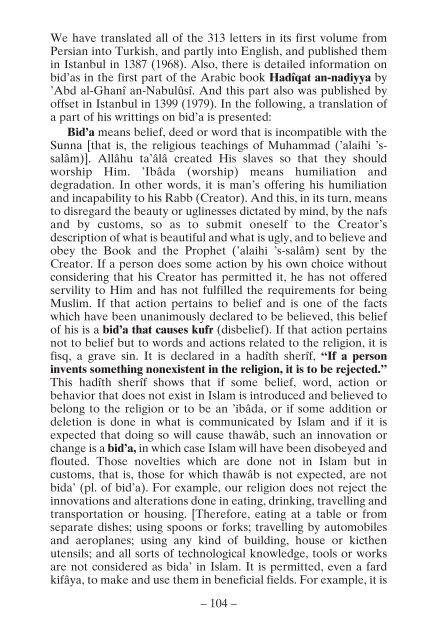Answer to an Enemy of Islam
Answer to an Enemy of Islam This is a refutation of the lies and slanders which the lâ-madhhabî Rashîd Rıdâ of Egypt, who appeared in the disguise of a religious man and wrote against the scholars of Islam in his book Muhâwarât.
Answer to an Enemy of Islam
This is a refutation of the lies and slanders which the lâ-madhhabî Rashîd Rıdâ of Egypt, who appeared in the disguise of a religious man and wrote against the scholars of Islam in his book Muhâwarât.
You also want an ePaper? Increase the reach of your titles
YUMPU automatically turns print PDFs into web optimized ePapers that Google loves.
We have tr<strong>an</strong>slated all <strong>of</strong> the 313 letters in its first volume from<br />
Persi<strong>an</strong> in<strong>to</strong> Turkish, <strong>an</strong>d partly in<strong>to</strong> English, <strong>an</strong>d published them<br />
in Ist<strong>an</strong>bul in 1387 (1968). Also, there is detailed information on<br />
bid’as in the first part <strong>of</strong> the Arabic book Hadîqat <strong>an</strong>-nadiyya by<br />
’Abd al-Gh<strong>an</strong>î <strong>an</strong>-Nabulûsî. And this part also was published by<br />
<strong>of</strong>fset in Ist<strong>an</strong>bul in 1399 (1979). In the following, a tr<strong>an</strong>slation <strong>of</strong><br />
a part <strong>of</strong> his writtings on bid’a is presented:<br />
Bid’a me<strong>an</strong>s belief, deed or word that is incompatible with the<br />
Sunna [that is, the religious teachings <strong>of</strong> Muhammad (’alaihi ’ssalâm)].<br />
Allâhu ta’âlâ created His slaves so that they should<br />
worship Him. ’Ibâda (worship) me<strong>an</strong>s humiliation <strong>an</strong>d<br />
degradation. In other words, it is m<strong>an</strong>’s <strong>of</strong>fering his humiliation<br />
<strong>an</strong>d incapability <strong>to</strong> his Rabb (Crea<strong>to</strong>r). And this, in its turn, me<strong>an</strong>s<br />
<strong>to</strong> disregard the beauty or uglinesses dictated by mind, by the nafs<br />
<strong>an</strong>d by cus<strong>to</strong>ms, so as <strong>to</strong> submit oneself <strong>to</strong> the Crea<strong>to</strong>r’s<br />
description <strong>of</strong> what is beautiful <strong>an</strong>d what is ugly, <strong>an</strong>d <strong>to</strong> believe <strong>an</strong>d<br />
obey the Book <strong>an</strong>d the Prophet (’alaihi ’s-salâm) sent by the<br />
Crea<strong>to</strong>r. If a person does some action by his own choice without<br />
considering that his Crea<strong>to</strong>r has permitted it, he has not <strong>of</strong>fered<br />
servility <strong>to</strong> Him <strong>an</strong>d has not fulfilled the requirements for being<br />
Muslim. If that action pertains <strong>to</strong> belief <strong>an</strong>d is one <strong>of</strong> the facts<br />
which have been un<strong>an</strong>imously declared <strong>to</strong> be believed, this belief<br />
<strong>of</strong> his is a bid’a that causes kufr (disbelief). If that action pertains<br />
not <strong>to</strong> belief but <strong>to</strong> words <strong>an</strong>d actions related <strong>to</strong> the religion, it is<br />
fisq, a grave sin. It is declared in a hadîth sherîf, “If a person<br />
invents something nonexistent in the religion, it is <strong>to</strong> be rejected.”<br />
This hadîth sherîf shows that if some belief, word, action or<br />
behavior that does not exist in <strong>Islam</strong> is introduced <strong>an</strong>d believed <strong>to</strong><br />
belong <strong>to</strong> the religion or <strong>to</strong> be <strong>an</strong> ’ibâda, or if some addition or<br />
deletion is done in what is communicated by <strong>Islam</strong> <strong>an</strong>d if it is<br />
expected that doing so will cause thawâb, such <strong>an</strong> innovation or<br />
ch<strong>an</strong>ge is a bid’a, in which case <strong>Islam</strong> will have been disobeyed <strong>an</strong>d<br />
flouted. Those novelties which are done not in <strong>Islam</strong> but in<br />
cus<strong>to</strong>ms, that is, those for which thawâb is not expected, are not<br />
bida’ (pl. <strong>of</strong> bid’a). For example, our religion does not reject the<br />
innovations <strong>an</strong>d alterations done in eating, drinking, travelling <strong>an</strong>d<br />
tr<strong>an</strong>sportation or housing. [Therefore, eating at a table or from<br />
separate dishes; using spoons or forks; travelling by au<strong>to</strong>mobiles<br />
<strong>an</strong>d aeropl<strong>an</strong>es; using <strong>an</strong>y kind <strong>of</strong> building, house or kicthen<br />
utensils; <strong>an</strong>d all sorts <strong>of</strong> technological knowledge, <strong>to</strong>ols or works<br />
are not considered as bida’ in <strong>Islam</strong>. It is permitted, even a fard<br />
kifâya, <strong>to</strong> make <strong>an</strong>d use them in beneficial fields. For example, it is<br />
– 104 –

















